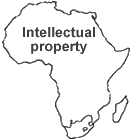

 |
 |
|
|
South African CopyrightsAn Information Pamphlet By virtue of the Copyright Act, copyright subsists automatically in the original work of any South African citizen, resident or domicile, both prior to publication and after publication. Ownership
of the copyright in a work generally rests in its author(s),
unless the author(s) agree(s) in writing to assign the copyright.
"Author" is specially defined in the Copyright Act,
but generally means the originator(s) of the work. If
the author is not a South African citizen resident or domicile,
copyright may subsist after publication in South Africa if this was
the first publication in the world.
No registration formalities are required (in distinction to
patent, design and trade mark rights) except in respect of cinematographic
films which may be registered. The
subjects in which copyright may subsist include written and musical
works (eg. literary and dramatic works, tables, works of reference)
artistic works (eg. paintings, sculpture, photographs, all irrespective
of artistic quality), architectural works, sound recordings, cine
films, TV programmes carrying signals and broadcasts. The
term of copyright is generally 50 years after the death of the author.
The
benefits of copyright protection are extended by proclamation to citizens
of, and works originating from, member countries of the Berne copyright
convention. By the same convention South Africans enjoy
copyright overseas. The Berne
convention includes most important countries, save for the USA. By way of a bilateral agreement between SA and USA the benefit of
copyright is conferred upon citizens of SA equally as if they were
citizens of the USA and vice versa, although registration requirements
have to be met in the USA. We
are ready to advise our clients in connection with any copyright questions
on problems they have, especially in the field of industrially applied
artistic works. Copyright in the industrial sphere Drawings of a technical nature (eg. engineering drawings) and works of craftsmanship of a technical nature (eg. prototypes) enjoy copyright in South Africa, not only against reproduction of the drawings in 2-dimensions but also against reproduction of the works (eg. machines, spare parts) in 3-dimensions. However, if the copyright owner introduces 3-dimensional reproductions to the market, which "authorised" reproductions are works which primarily have a utilitarian purpose and are made by an industrial process, their copyright protection against copying the authorised reproductions (so called "reverse engineering") is lost. |
|